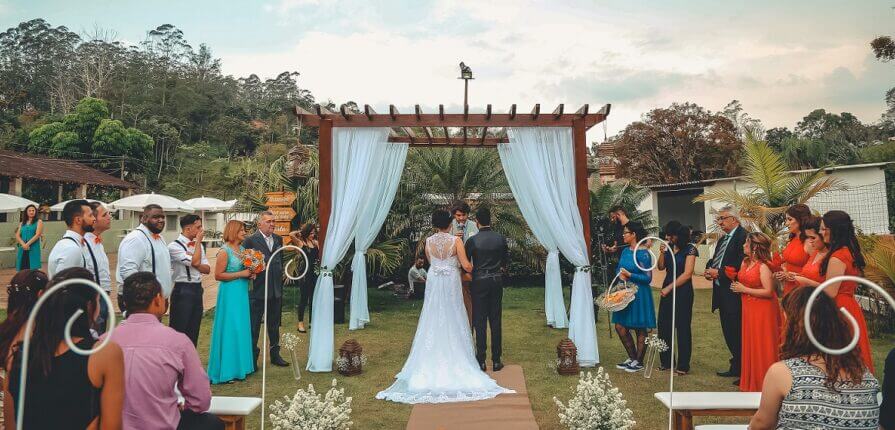There’s a lot to consider when it comes to outdoor lights for a wedding venue. You want to create the right amount of visibility without ruining the mood. You want guests to be comfortable and safe, and able to see what they’re doing. And you want the atmosphere to be magical and unique to the particular wedding’s theme and feel. Here are a few common questions about outdoor lights for weddings that are important for venue owners, event and wedding planners, and the wedding party themselves to consider.
Why are lights important for a wedding venue?
Weddings bring together a lot of people for a wonderful celebration. And nothing dampens the celebratory mood more than a disaster or accident. You certainly don’t want guests to trip and fall because the footing wasn’t clear or the pathway was unlit. Outdoor surfaces can be challenging, and navigating them in darkness isn’t a good idea. So, wedding venue lights are important for a very practical reason: safety.
Beyond that, however, the lighting used in a wedding venue does so much to create the mood. Lighting is a powerful part of the atmosphere. You can have the perfect wedding decor, but if the lighting is too bright, glaring, and angled the wrong way, it won’t feel magical–it will feel blinding! On the other hand, inadequate lighting can make a magical space feel dingy, dim, and even creepy.
When should you consider the outdoor lights for a wedding?
The sooner, the better. There’s a lot of planning that goes into a wedding, and like any other aspect, the sooner you can line up suppliers, plan installers, and coordinate with the rest of the wedding details, the easier it is.
Venue owners: consider what’s missing in your exterior lighting options before the wedding season is in full swing. It’s best to have time for a professional lighting company to come to the venue, hear your vision, and create a custom design for the perfect lighting system.
Wedding planners: communicate with venue owners about what you envision for each part of the wedding. Ask about fixtures that are built-in, if brightness is adjustable, and what options are available in how the different types of lighting are set up. If the venue itself doesn’t include lighting options (or doesn’t have the kind of lighting you want), you might need to line up an event lighting company.
Who’s responsible for providing outdoor lights for a wedding venue?
It depends; the venue owner or the wedding planner, typically. For venue owners, the more lighting options you can offer the better. You can improve your event packages with a variety of lighting options, and it’s a one-time investment that keeps paying off. Low-voltage LED lights are energy-efficient; and with high-quality fixtures, which usually have a lifetime or significant warranty, there’s not much risk. You’ll be able to offer guests more options for creating the kind of event they want.
How do you light an outdoor wedding?
There are all sorts of outdoor lighting options you can use for weddings. You’d start by seeing what exterior lights are available at the wedding venue:
- Are there spotlights in the parking area?
- Are walkways clearly lit?
- Is there landscape lighting to show off great features and create visual interest?
- Are perimeters clearly marked with lighting?
- Are entryways lit and easy to find?
- Is any of the lighting adjustable?
- How is the lighting controlled?
It’s a good idea to visit the venue around the time the wedding will happen, and notice how the shadows and lighting needs change from dusk to later in the evening. Do you notice any shadowy corners, poorly lit pathways, or rough surfaces without visibility?
Consider where the main events of the wedding will take place and what kind of lighting you want. During the ceremony, all eyes are on the wedding party. You want to use strategically place spotlights to create clear visibility without blinding anyone. You can also work with ambient lights (such as string lights or downlighting) to enhance the feel without adding much brightness. For the reception, focus on lighting up the main areas of activity: the head table, the food table, the bar, and the dance floor.
Here are some ideas:
- Have string lights hung under the tent and wound around support poles.
- Have spotlights angled downward and mounted on trees to create pools of light.
- Hang an outdoor chandelier over the head table.
- Have bistro lights hung over the bar and immediate surrounding area to create a small, cafe-like space.
- Use color-changing, adjustable lights around the dance floor and adjust the color as the night goes on.
- Position uplights at the base of poles, near floral arrangements or structures. Space them evenly to create a uniform look.
- Use string lights and walkway light fixtures to create perimeters.
How much lighting do you need for an outdoor wedding?
That’s a tough one to answer because so much depends on the size of the wedding and the layout of the venue. In general, though, we find that customers tend to underestimate the number of fixtures. It’s often a better look to use more fixtures, closer together but on a lower brightness setting. This creates a more uniform look, helps eliminate shadows and dark spots, and lights up the venue without creating glare for your guests.
Remember that you can use a mix of lighting: what’s already available at the wedding venue, what you have a professional exterior lighting company help with, and what you do yourself. If you’re in the St. Louis area, we can help with design and installation of the best outdoor lighting for your wedding venue. Get in touch today for a free consultation.

